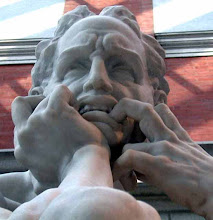THE CALL
I was caught off guard when I heard her voice on the phone. “How are you, Michael?” she said. “It’s Glea.”
I knew her voice, but hearing it felt alien. It sounded to me like a voice one would avoid if they could; a voice belonging to a neighbor who’s been crouching in your garden every evening at dusk, watching as you walk around your kitchen in your underwear; the person who you knew had poisoned your cat, though you could not prove it, and who called because they knew you knew but couldn't say anything about it. I couldn’t tell right then which of us was being creepy.
I responded with shortness. “Glea.”
Glea Carroll of the McNally Agency had been a great support when I was marketable. She stayed in constant contact, putting me in touch with publishers and editors, people she said she knew I’d click with. As my agent Glea facilitated many good things for me. But self interest clung to her like the smell of something burning. I was never crazy about that part of her, and now that I was no longer a hot commodity I discovered my instincts about her had been justified.
“Michael, I know I haven’t called. But I have been thinking about you.” She must have detected the blank recognition, the plain lack of response in my voice.
“I’ve been thinking about you too,” I said finally.
“I realize it’s been some time.” She spoke in clear, distinct tones.
Damn, I thought. I hoped like hell she didn’t feel sorry for me. I wanted to savor my resentment. Across the room the cat began hacking and then puked on some papers I’d laid down when the phone rang. “Goddamit,” I growled through crooked teeth.
“Is this not a good time?” Glea asked. “Should I not have called?”
“No. It’s fine,” I told her, “my cat. How have you been?”
“I’m well,” she said. Glea , always proper, never said "I'm fine," or "I'm good."
“I’m also well,” I responded flatly. “To what do I owe the honor, Glea?”
She hesitated, only momentarily, and then explained why she called. She knew I’d been in a rut since the accident. She thought she had something I might be interested in trying. “You’re not drinking?” she asked at one point.
“No, I’m not drinking,” I said. I was lying. I’d turned into a morning drinker. Mostly wine when I stayed home. Beer if I walked down to play the juke box at the Top Hat where Milna poured drafts and flaunted her huge rack behind the bar. On days when I’d stop caring altogether, often after not sleeping, I’d drive instead of walk. The accident seemed, at those times, remote. Maybe I was remote. The walls of my apartment looked pale to me. “Why do you ask, Glea?”
“I have a contact at Iowa,” she said. “Do you think you’d consider putting together a workshop for them? They’re interested in having you. I can put you in touch.”
In touch was something I hadn’t been in a while. I touched my face. “Teach what to who?” I asked.
“We can work all that out,” she said straight forwardly, as if she had all of it already planned. “You’re a name. Published. And they’re paying.”
The offer was a far cry from television interviews and book signings. I looked across the room and squinted at the stack of bills on the desk. “I could use a change,” I told her. “Iowa. How much and what do I need to do?”
“Let me make some calls,” she said, and we ended it there.
I scribbled her name on one of the refrigerator lists, then grabbed my keys. It was Friday. Milna typically wore a skirt on Fridays. She’d be working till noon.
Sunday, October 07, 2007
Subscribe to:
Post Comments (Atom)

No comments:
Post a Comment